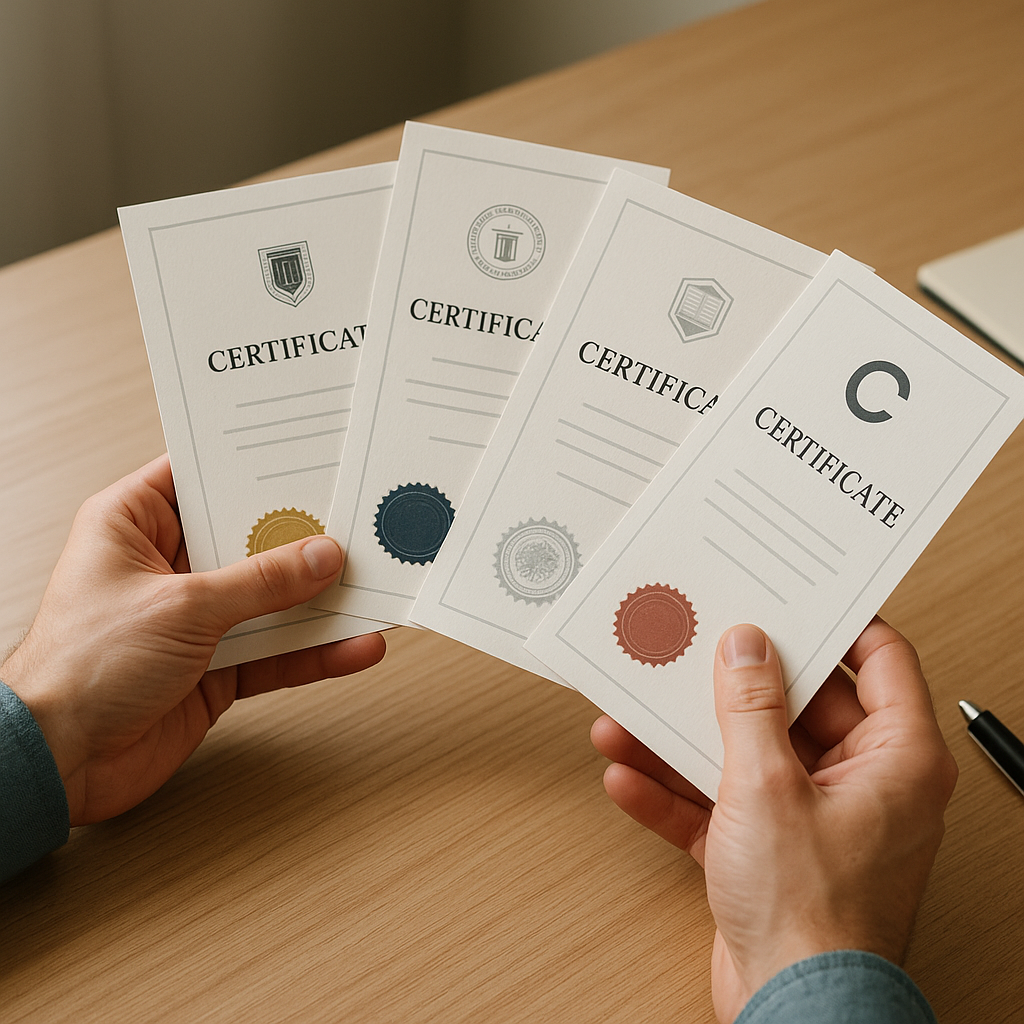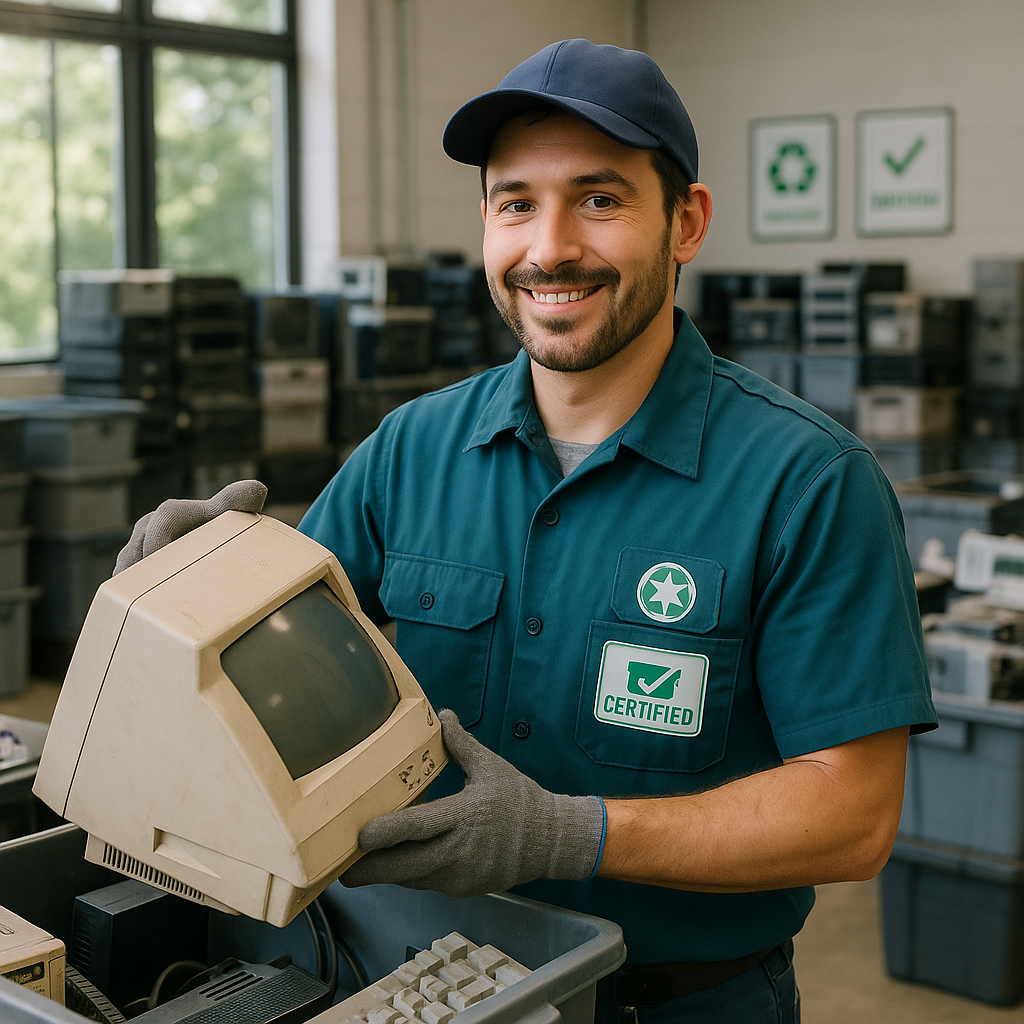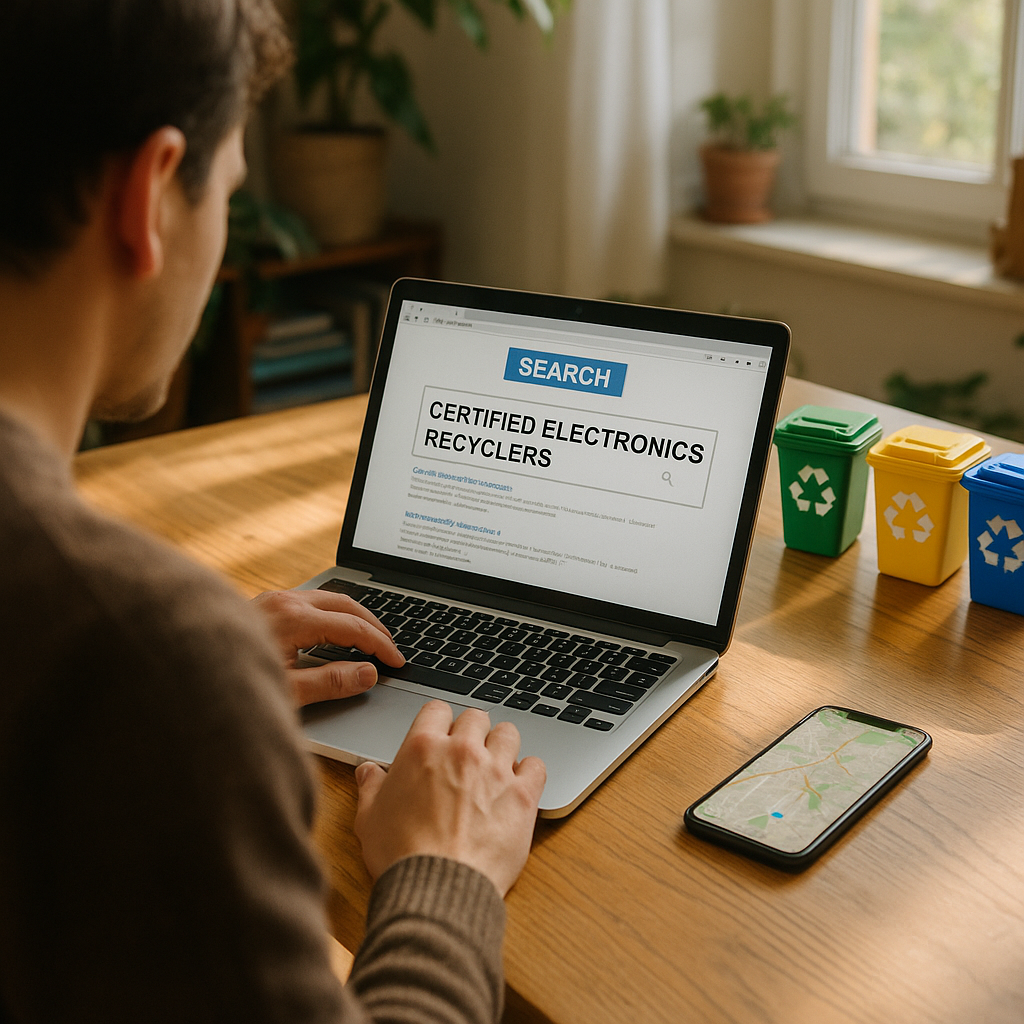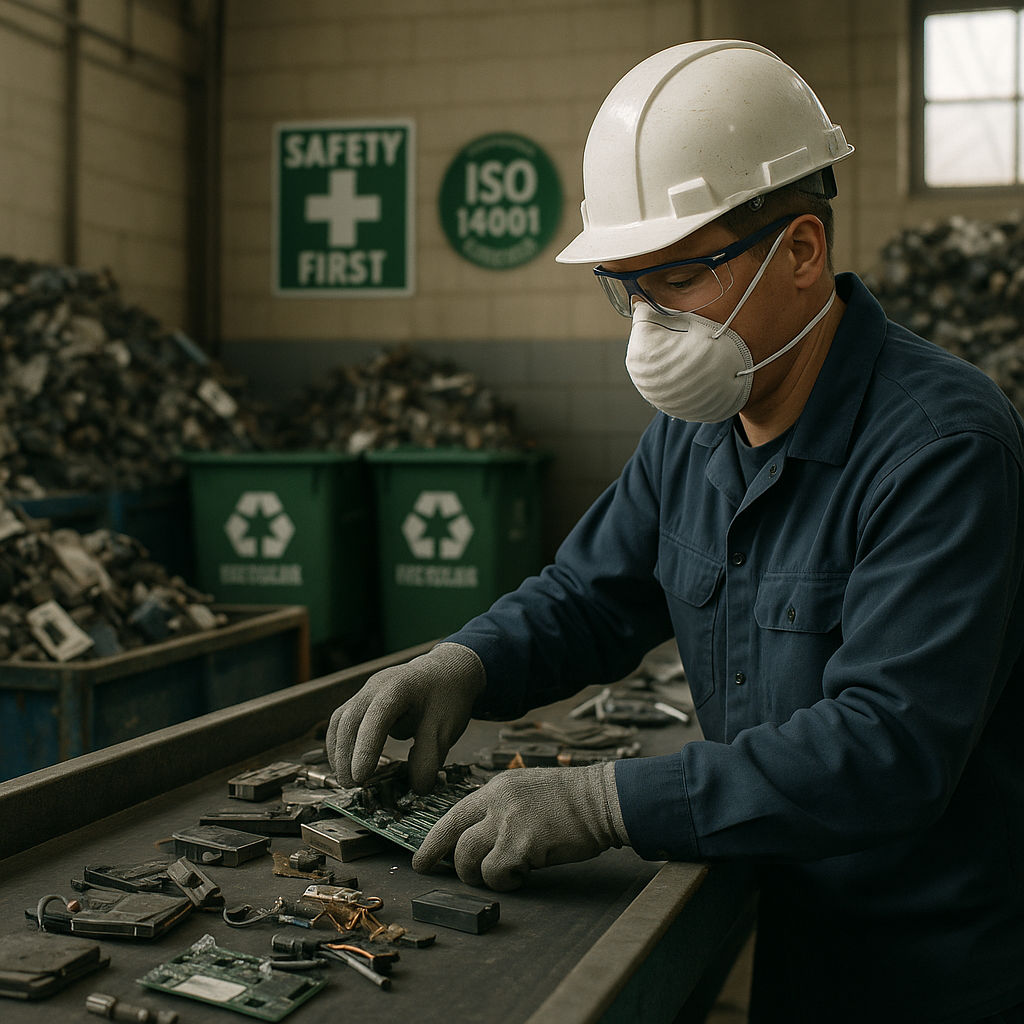5901 Botham Jean Blvd, Dallas, TX 75215
Certified Electronics Recycling: Everything You Need to Know
September 12, 2025The surge of electronic waste presents a growing environmental challenge. Certified electronics recycling offers a solution by ensuring these materials are managed responsibly instead of ending up in landfills. This specialized process involves the careful handling of used electronics by facilities that have proven their commitment to high environmental standards through rigorous third-party audits.
Certified electronics recycling focuses on the responsible processing of used electronic devices by recyclers who meet environmental criteria set by recognized certifying bodies. These recyclers adhere to strict protocols for safely handling potentially hazardous materials found in electronics. They are not only claiming to be environmentally responsible—they have been verified by independent accredited organizations that continually monitor their compliance.
Two primary certification standards dominate the industry: the Responsible Recycling (R2) Standard, developed by Sustainable Electronics Recycling International (SERI), and the e-Stewards® Standard. Both certifications ensure recyclers follow best practices for environmental protection, worker safety, and data security. By choosing certified electronics recyclers, businesses and consumers contribute to preventing toxic substances from contaminating soil and water while supporting the recovery of valuable materials that can be reused in new products.
What are the Major Certification Standards?

There are two main certification standards for electronics recyclers in the United States: the Responsible Recycling (R2) Standard and the e-Stewards Standard. Both are recognized by the EPA and provide frameworks for assessing environmental practices, worker health and safety, and security protocols of electronics recycling facilities.
The R2 Standard
The R2 Standard, developed by Sustainable Electronics Recycling International (SERI), takes a flexible approach to responsible recycling. This certification focuses on extending device lifecycles and contributing to the circular economy. R2-certified recyclers must demonstrate commitment to data protection, health safety, and environmental responsibility.
One of R2’s defining features is its adaptability. Companies can create custom standards that fit their specific operational needs while still adhering to core requirements. The certification process typically takes 8-12 months and requires ongoing audits to ensure compliance. R2 pricing tends to be more predictable, with fixed annual costs for certification.
R2 permits the export of e-waste to developed countries under controlled conditions. This flexibility makes it attractive to businesses that need to move materials across borders while maintaining responsible practices.
The e-Stewards Standard
The e-Stewards Standard, created by the Basel Action Network, sets more rigid guidelines for electronics recycling. It requires adherence to ISO 14001 environmental management systems and NAID AAA certification for data destruction. e-Stewards emphasizes preventing the export of toxic materials to developing nations.
Unlike R2, e-Stewards mandates that all corporate facilities within a company be certified. The certification price varies based on company size and revenue. Its export conditions are significantly stricter, only allowing materials to be sent to countries that comply with the Basel Convention requirements.
e-Stewards certification particularly focuses on international environmental and social justice, with a standardized approach that ensures recycling processes remain consistent across different vendors.
Key Similarities and Differences
Both standards share important similarities. They require adherence to environmental compliance standards, promote reuse and recycling of materials, and mandate secure destruction of data. Each certification involves rigorous third-party audits to ensure compliance.
However, they differ in their approach to implementation. R2 offers more customization while e-Stewards provides a more standardized framework. e-Stewards places stricter limitations on the export of materials, while R2 allows more flexibility under controlled conditions.
The choice between these certifications often depends on a company’s specific needs, operational scope, and whether international material transfer is required in their business model.
What are the Benefits of Using Certified Recyclers?

Choosing certified electronics recyclers offers significant advantages for businesses looking to responsibly dispose of outdated equipment. These specialized partners follow strict standards verified by independent third-party auditors, ensuring your electronic waste is handled properly from collection to final processing.
Environmental and Health Protection
Electronic waste contains numerous hazardous materials that pose serious threats when improperly handled. Certified recyclers follow rigorous protocols to prevent these toxins from contaminating our environment.
E-waste that ends up in landfills or incinerators releases harmful substances like lead, mercury, and cadmium into our soil, water, and air. These toxins can enter the food chain and cause severe health problems, including birth defects and damage to vital organs such as the brain, heart, and liver.
By working with certified recyclers, businesses actively reduce pollution and protect community health while lowering their carbon footprint.
Secure Data Destruction
Data breaches remain a critical concern for businesses. In 2023 alone, over 3,200 reported breaches affected more than 350 million individuals, marking a 78% increase from the previous year.
Certified electronics recyclers offer guaranteed data destruction services using secure methods like data wiping and physical destruction of storage components. This comprehensive approach ensures sensitive information cannot be recovered from discarded devices.
Unlike basic deletion or formatting, which leave recoverable data fragments, certified recyclers follow documented protocols that protect businesses from the financial and reputational damage of data breaches.
Resource Conservation and Recovery
Electronics contain valuable materials that can be recovered and reused. For every million cell phones recycled, recyclers can recover:
- 35,000 pounds of copper
- 772 pounds of silver
- 75 pounds of gold
- 33 pounds of palladium
This recovery process conserves natural resources and reduces the environmental impact of mining and processing virgin materials. It also saves energy—recycling one million laptops saves energy equivalent to the electricity used by over 3,500 U.S. homes in a year.
Regulatory Compliance and Liability Protection
Electronics disposal is regulated at both federal and state levels. Working with certified recyclers helps businesses navigate these complex requirements and avoid potential penalties.
Certified recyclers provide complete documentation of proper disposal, including certificates of destruction that serve as critical evidence of compliance during audits. This documentation protects businesses from the legal consequences of improper disposal, which can include substantial fines and reputational damage.
Support for Sustainability Goals
Modern consumers and investors increasingly favor businesses that demonstrate environmental responsibility. Certified electronics recycling supports corporate sustainability initiatives in several ways:
- Reducing waste sent to landfills
- Lowering overall carbon footprint
- Supporting circular economy principles
- Providing verifiable environmental metrics for sustainability reporting
These documented practices help businesses demonstrate concrete actions behind their sustainability commitments, enhancing brand reputation among environmentally conscious stakeholders.
Access to Quality Reusable Equipment
Many certified recyclers also specialize in refurbishment, extending the life of functional equipment through testing, repairs, and proper data wiping. Rather than premature disposal, businesses can support equipment reuse programs that:
Provide affordable technology to schools, nonprofits, and underserved communities. Create jobs in the refurbishment sector. Maximize the useful life of electronics before final recycling becomes necessary.
These programs reduce waste while creating social benefits, aligning perfectly with comprehensive corporate social responsibility initiatives.
How Can You Find a Certified Electronics Recycler?

Finding a certified electronics recycler ensures your e-waste is handled responsibly with minimal environmental impact. The EPA encourages organizations to seek certification by demonstrating to independent third-party auditors that they meet specific standards for safely recycling and managing electronics.
Currently, two main certification standards exist in the electronics recycling industry: the Responsible Recycling (“R2”) Standard and the e-Stewards® Standard. These certifications verify that recyclers follow strict protocols for data security, worker safety, and environmental protection.
Resources for Businesses and Organizations
The EPA specifically recommends businesses, government agencies, and other large-scale generators of electronic waste work with certified recyclers. Organizations can find certified recycling facilities through directories maintained by the certification bodies:
- The R2 certification program offers a searchable directory of certified facilities.
- The e-Stewards® program maintains a similar directory of certified recyclers.
These directories allow searches by location and service. Many certified recyclers provide additional services such as secure data destruction, asset management, and on-site collection for large quantities.
Options for Households and Individuals
For households with smaller quantities of electronics to recycle, several programs connect consumers with certified recycling options:
- Call2Recycle operates a nationwide network for recycling cell phones and rechargeable batteries.
- GreenerGadgets helps consumers find local drop-off points that work with certified recyclers.
- Earth911 provides a searchable database of recycling options for various electronic items near you.
Many electronics manufacturers and retailers also offer take-back programs that partner with certified recyclers. Check with the original manufacturer of your device or major electronics retailers for information about their recycling programs.
What to Look For When Choosing a Recycler
When selecting an electronics recycler, verify their certification status and ask about their downstream processes. Certified recyclers should provide documentation of their certification and explain how they handle potentially hazardous components.
Look for recyclers who can provide a certificate of recycling or destruction, especially if you’re recycling devices with sensitive data. This documentation proves your electronics were handled properly.
By choosing a certified electronics recycler, you ensure your unwanted devices are handled responsibly, valuable materials are recovered, and harmful substances don’t end up in landfills or unregulated facilities overseas.
Conclusion: The Importance of Certified Electronics Recycling

Certified electronics recycling is a cornerstone of responsible e-waste management as our reliance on technology grows. The benefits of choosing certified recyclers extend far beyond simple disposal. Individuals and businesses who opt for this path ensure their discarded devices are handled according to strict environmental standards, preventing toxic materials like lead, mercury, and cadmium from contaminating landfills and water supplies.
The importance of certification lies in programs like R2 (Responsible Recycling) and e-Stewards, which require recyclers to follow rigorous protocols for data security, worker safety, and environmental protection. This thorough approach conserves valuable resources such as copper, silver, gold, and palladium that would otherwise be lost. Recycling one million laptops, for example, saves enough energy to power more than 3,500 homes annually. As electronic waste continues to grow rapidly, choosing certified recyclers is essential for environmental sustainability, data protection, and resource conservation.
Ensure your electronics are recycled properly by contacting Okon Recycling at 214-717-4083 for certified electronics recycling services that protect both your data and our environment.
